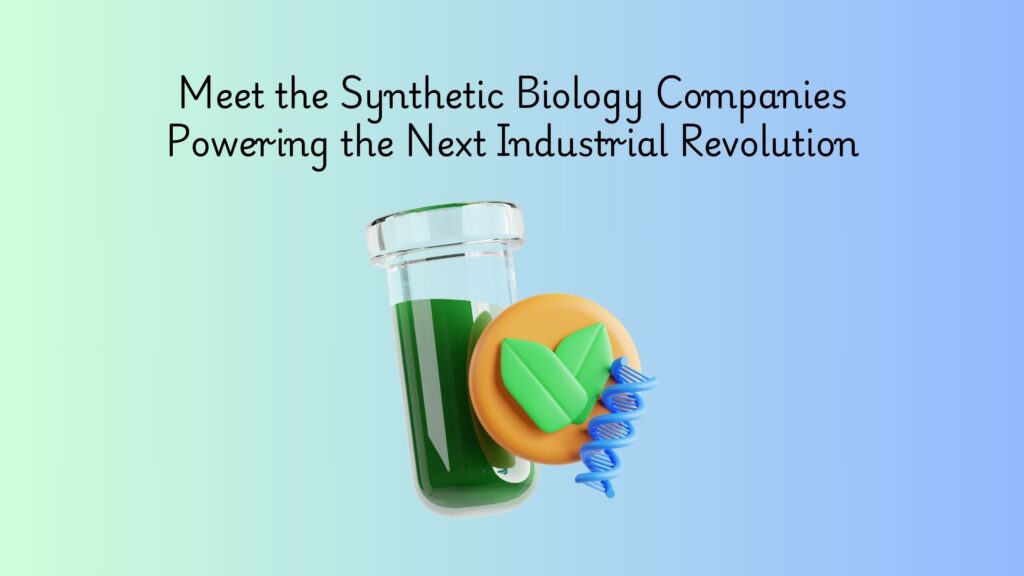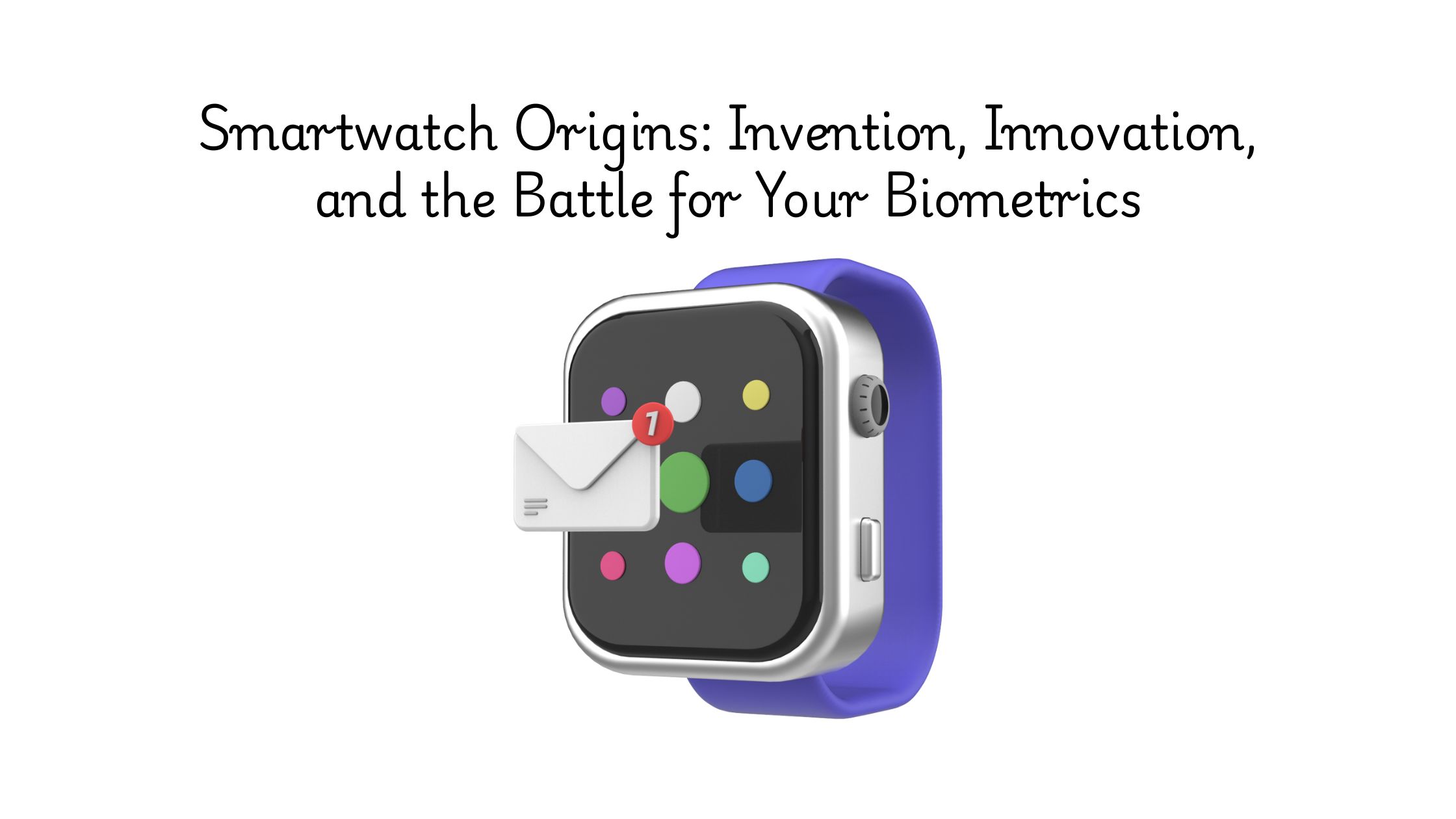Synthetic biology has leapt from academic labs to the industrial scale. The global market is projected to grow from $19.3 billion in 2024 to $61.6 billion by 2029, driven by breakthroughs in programmable microbes, enzyme design, and AI-powered bioengineering.
From lab-grown therapeutics and precision agriculture to sustainable materials and clean fuels, these companies aren’t just modifying life; they’re manufacturing it.
But here’s the catch: not every biotech startup is truly innovating. The real players are the ones developing proprietary tech, filing patents, scaling production, and solving the messy challenges of biology at scale.
In this article, we are sharing seven synthetic biology companies that are genuinely reshaping our future. They’re rewriting the rules of chemistry, medicine, and manufacturing, one gene at a time.
Let’s dive into the new architects of life itself.
#1. Ginkgo Bioworks
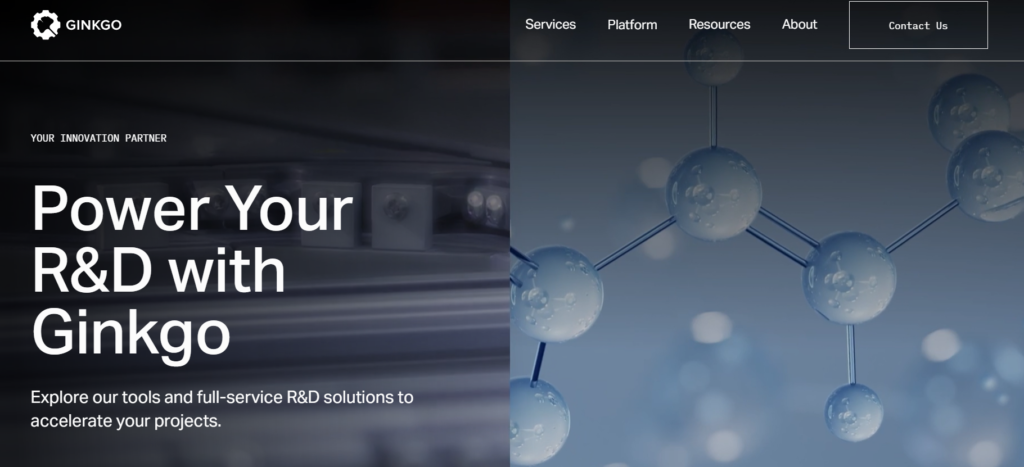
Source: Ginkgo Bioworks
Founded in 2008 by MIT scientists Jason Kelly, Reshma Shetty, Barry Canton, Austin Che, and their professor Tom Knight, Ginkgo Bioworks is headquartered in Boston, Massachusetts. Known as “The Organism Company,” Ginkgo specializes in using genetic engineering to produce bacteria with industrial applications, enabling advancements across sectors such as agriculture, pharmaceuticals, and biosecurity.
Industry Impact
Ginkgo has transformed synthetic biology by providing a horizontal platform for cell programming, allowing clients to design custom microorganisms for diverse applications. This approach has accelerated innovation in industries ranging from agriculture to pharmaceuticals, making biotechnology more accessible and scalable.
Key Innovations
- Launch of Protein LLM and Model API
In September 2024, Ginkgo introduced a large language model (LLM) for protein design, along with an API that grants researchers and developers access to this and other synthetic biology AI systems. This initiative aims to democratize advanced AI tools in biological research. - Strategic Collaboration with Syngenta
In July 2024, Ginkgo partnered with Syngenta to develop and optimize microbial strains for producing secondary metabolites, aiming to expedite the launch of innovative biological solutions in agriculture. - Enzyme Innovation Alliance with Novus International
In October 2024, Ginkgo formed an alliance with Novus International to develop next-generation feed additives to improve livestock health and productivity, focusing on more efficient and cost-effective enzyme production.
Patent Activity
As of 2024, Ginkgo Bioworks holds approximately 188 patents globally, with over 70% active. These patents primarily focus on areas such as synthetic promoters, secretion signals, and modified viral vectors, underscoring the company’s commitment to advancing synthetic biology.
Notable Patents
#1. US12091435: Antibody-Evading Virus Vectors
This patent describes AAV capsid proteins comprising modifications in the amino acid sequence, enhancing their ability to evade antibodies, which is crucial for gene therapy applications.
#2. US12077799: Chimeric Terpene Synthases
This patent details the creation of chimeric terpene synthases, enzymes engineered to produce specific terpene compounds, which have applications in pharmaceuticals and fragrances.
#3. US20240200019: Genetically Modified Yeast Cells for Increased Lipid Yield
This patent covers genetically modified yeast cells designed to produce higher lipid yields, which are beneficial for biofuel production and other industrial applications.
#2. Twist Bioscience
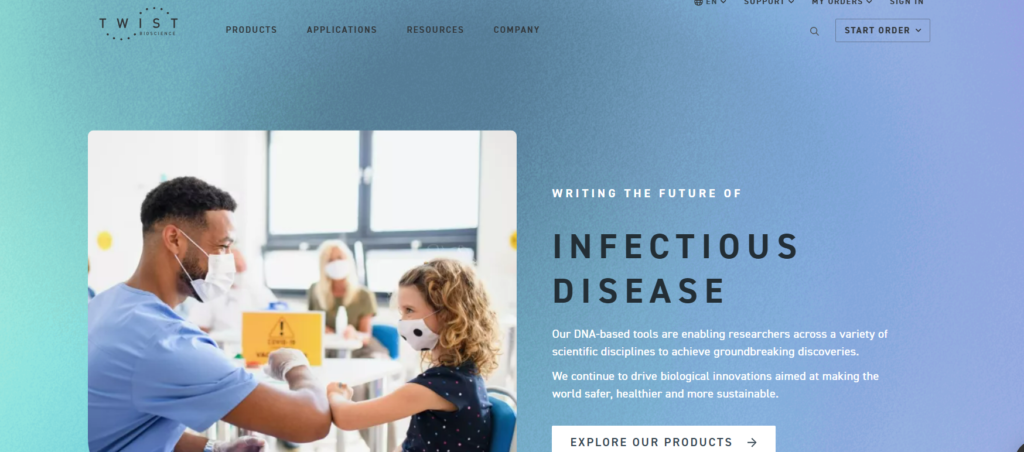
Source: Twist Bioscience
Founded in 2013 by Emily Leproust, Bill Banyai, and Bill Peck, Twist Bioscience is headquartered in South San Francisco, California. The company has revolutionized synthetic DNA manufacturing with its proprietary semiconductor-based technology, enabling high-throughput DNA synthesis. This innovation supports advancements across multiple sectors, including healthcare, industrial chemicals, agriculture, and academic research.
Industry Impact
Twist Bioscience’s platform has significantly accelerated research and development in synthetic biology by providing rapid, scalable, and cost-effective DNA synthesis solutions. Their technology facilitates applications ranging from gene editing and drug discovery to agricultural biotechnology, thereby democratizing access to high-quality synthetic DNA.
Key Innovations
- Silicon-Based DNA Synthesis Platform
Twist developed a proprietary, semiconductor-based, synthetic DNA manufacturing process featuring a high-throughput silicon platform. This allows miniaturization of the chemistry necessary for DNA synthesis, translating into time and cost savings for customers across their workflows. - Expansion of Gene Offering with Long Gene Fragments
In 2023, Twist Bioscience expanded its gene synthesis portfolio to include long gene fragments up to 50 kilobases. This advancement enables researchers to access longer DNA sequences necessary for complex genetic engineering projects. - Antibody Discovery Collaborations
Twist has entered into multiple collaborations to advance antibody discovery. For instance, in August 2023, they partnered with Ono Pharmaceutical to discover novel antibodies for autoimmune diseases, leveraging Twist’s Library of Libraries, an expansive collection of synthesized antibody libraries.
Patent Activity
Twist Bioscience holds a robust portfolio of patents focusing on synthetic DNA technologies. Notably, they have developed methods for de novo gene synthesis and DNA-based data storage solutions, underscoring their commitment to innovation in synthetic biology.
Notable Patents
#1. US11562103: Nucleic Acid-Based Data Storage
This patent covers compositions, devices, systems, and methods for generating and using biomolecule-based information storage, highlighting Twist’s innovative approach to DNA data storage solutions.
#2. US12201857: Methods and Compositions relating to COVID Antibody epitopes
This patent covers methods and compositions relating to optimized antibody libraries with nucleic acids encoded for an antibody comprising modified sequences.
#3. Arzeda
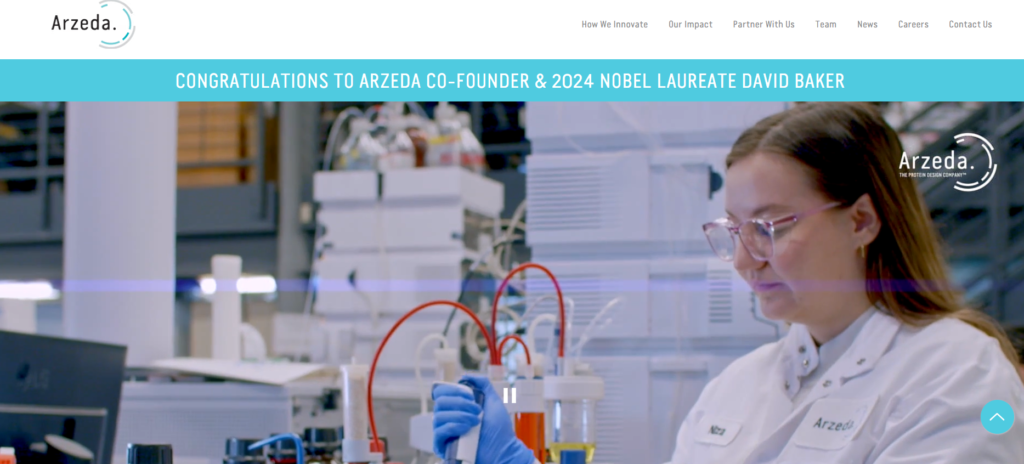
Source: Arzeda.com
Founded in 2008 and headquartered in Seattle, Washington, Arzeda is a pioneer in computational protein design and enzyme engineering. The company integrates synthetic biology with machine learning to design new enzymes from scratch, ones that don’t exist in nature, enabling the creation of novel molecules for industries like agriculture, food, and materials science.
Their platform has produced enzymes used in real-world consumer products, including collaborations with Unilever and Kalsec. As of 2024, Arzeda has over 100 active enzyme designs in use or testing globally.
Industry Impact
Arzeda is helping shift global supply chains from petrochemical-based production to enzyme-driven biosynthesis. Their work enables the on-demand design of biocatalysts, replacing synthetic chemicals with cleaner, tailored biological alternatives. They are especially influential in food flavoring, crop protection, and high-performance materials.
Key Innovations
1. Protein Design Suite (AI + Computational Biology)
Arzeda’s platform combines deep learning, thermodynamics modeling, and synthetic biology to generate proteins with pre-defined industrial functions. This tech enables the design of enzymes with atomic-level precision, making them 10–100x more efficient than traditional discovery methods.
2. Partnership with Unilever for Sustainable Detergents
In a landmark deal, Arzeda designed enzymes for Unilever’s household cleaning line to replace petrochemical components with eco-friendly bioenzymes. Products began shipping with Arzeda-derived enzymes in 2023.
3. Fermentation-Based Manufacturing Pipeline
In 2024, Arzeda launched a scalable microbial fermentation pipeline to manufacture newly designed enzymes commercially, accelerating the productization of lab-developed enzymes.
Patent Activity
Arzeda has a total of 39 patents globally, out of which more than 71% are active, focusing on engineered enzymes, biosynthetic pathways, and synthetic metabolic networks.
Notable Patents
#1. US11866758B2: Methods and Compositions for Preparing Tagatose from Fructose
This patent details compositions and methods for converting fructose to tagatose using thermophilic fructose C4-epimerases derived from thermophilic microorganisms. Tagatose is a low-calorie sweetener that can be used in food and beverages.
#2. US10025900B2: Automated Method of Computational Enzyme Identification and Design
This patent describes computational methods for engineering, selecting, and identifying proteins with desired activities. It focuses on automated design and screening techniques to develop proteins with specific functional attributes, such as ligand binding and catalytic activity.
#4. Codexis

Source: Codexis
Founded in 2002 and headquartered in Redwood City, California, Codexis is a leader in enzyme engineering for synthetic and industrial biology. The company’s proprietary platform, CodeEvolver®, uses directed evolution to create highly efficient enzymes for drug manufacturing, food processing, and sustainable chemicals.
In 2024, Codexis signed a multi-million-dollar deal with GSK to license enzymes optimized for API (active pharmaceutical ingredient) production, reinforcing its position as a biotech enabler in pharma.
Industry Impact
Codexis enables greener, faster, and more cost-effective chemical processes across industries by replacing traditional synthetic chemistry with tailored enzymes. Their tech helps major pharma companies reduce waste, energy usage, and production time while increasing yield, making them a sustainability linchpin in bioprocessing.
Key Innovations
1. CodeEvolver® Enzyme Optimization Platform
Codexis’s flagship innovation is CodeEvolver®, a patented platform that rapidly evolves proteins for better specificity, stability, and activity. It’s been licensed to companies like Merck, Novartis, and Nestlé for use in biocatalysis and diagnostics.
2. Biocatalysts for RNA Therapeutics Manufacturing
In 2024, Codexis launched a novel enzyme specifically optimized for 5’-capping of mRNA, improving the efficiency of RNA-based vaccine and therapeutic production. This enzyme is now in use in pilot manufacturing lines.
3. Partnership with Nestlé for Food Enzymes
Codexis collaborated with Nestlé Health Science to develop enzymes that enhance the taste and nutritional profiles of food products without synthetic additives. Their enzymes enable real-time sugar conversion and allergen reduction.
Notable Patents
#1. US9102959B2: Engineered Ketoreductase Polypeptides for the Preparation of Phenylephrine
This patent describes engineered ketoreductase enzymes optimized for the stereoselective reduction of ketones to produce (R)-phenylephrine, a compound widely used as a decongestant. The engineered enzymes offer improved efficiency and selectivity over naturally occurring counterparts.
#2. US20180320162A1: Engineered Ligase Variants
This patent application details engineered ligase enzymes with enhanced properties, including improved efficiency in catalyzing the formation of phosphodiester bonds. These variants are particularly useful in molecular biology applications, such as DNA cloning and sequencing.
#5. Amyris

Source: Amyris
Founded in 2003 and headquartered in Emeryville, California, Amyris is a pioneering synthetic biotechnology company that leverages genetically engineered microbes to produce sustainable ingredients for various industries, including pharmaceuticals, cosmetics, and food. The company’s technology enables the conversion of plant sugars into high-value molecules, offering eco-friendly alternatives to traditionally sourced ingredients.
Industry Impact
Amyris has significantly influenced the shift toward sustainable production methods by replacing petroleum-based and animal-derived substances with bioengineered alternatives. Their innovations have led to developing environmentally friendly products in sectors such as skincare, sweeteners, and pharmaceuticals.
Key Innovations
1. Semi-Synthetic Artemisinin for Malaria Treatment
In collaboration with the Bill & Melinda Gates Foundation, Amyris developed a semi-synthetic version of artemisinin, a critical antimalarial drug. This innovation has enhanced the accessibility and affordability of malaria treatments globally.
2. Sustainable Squalane Production
Amyris engineered yeast strains to produce squalane, a moisturizing agent traditionally sourced from shark liver oil. This biofermented squalane offers a sustainable and ethical alternative for the cosmetics industry.
3. RebM: A Zero-Calorie Sweetener
Utilizing synthetic biology, Amyris designed microorganisms to produce Rebaudioside M (RebM), a high-intensity, zero-calorie sweetener. This method allows for large-scale production of RebM without relying on traditional stevia plant extraction.
Notable Patents
1. US20100311065A1: Genetically Modified Microbes Producing Isoprenoids
This patent describes genetically modified yeast cells engineered to persistently produce isoprenoid compounds, which are valuable in various industrial applications.
2. AU2020268897A1: Kaurenoic Acid 13-Hydroxylase (KAH) Variants and Uses Thereof
This patent details the development of enzyme variants that improve the efficiency of producing specific compounds, such as RebM, in microorganisms.
#6. GenScript Biotech Corporation
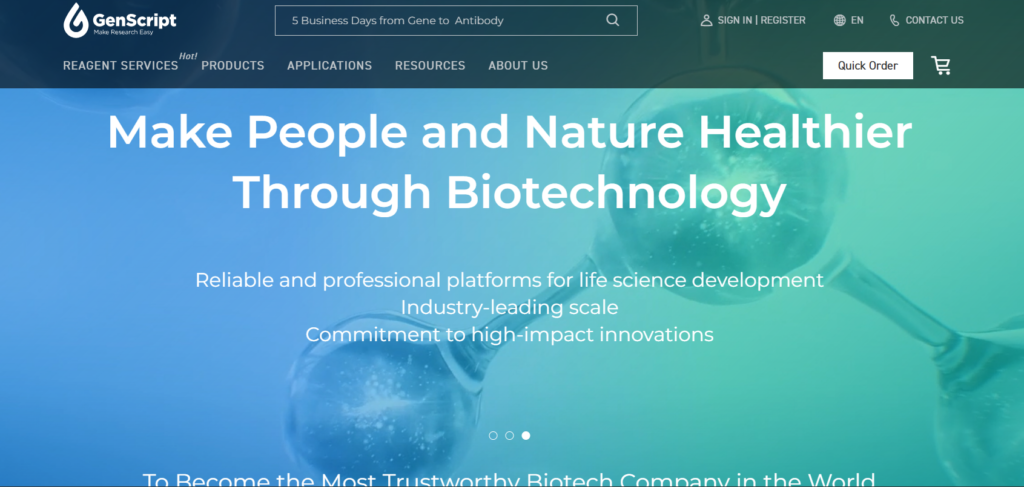
Source: GenScript
Founded in 2002 in New Jersey by Dr. Fangliang Zhang, GenScript Biotech Corporation has established itself as a global leader in biotechnology, providing a comprehensive suite of services and products that facilitate life sciences research and applications. The company’s offerings encompass gene synthesis, peptide synthesis, protein expression, antibody development, and preclinical drug development services.
With a mission to “Make People and Nature Healthier Through Biotechnology,” GenScript serves over 200,000 customers across more than 100 countries.
Industry Impact
GenScript has significantly influenced the biotechnology landscape by pioneering gene synthesis services, thereby accelerating advancements in synthetic biology and genetic engineering. Their high-quality, customizable solutions have empowered researchers and pharmaceutical companies to expedite drug discovery, develop novel therapeutics, and innovate across various sectors, including agriculture and industrial biotechnology.
Key Innovations
- Codon Optimization Technology
GenScript’s proprietary codon optimization technology enhances gene expression across various systems by modifying codon sequences to match the preferred codon usage of the host organism. This optimization leads to increased protein yield and functionality, benefiting applications in vaccine development and therapeutic protein production. - CRISPR/Cas9 Licensing Agreement
In May 2021, GenScript entered into a non-exclusive license agreement with ERS Genomics, granting them access to ERS’s CRISPR/Cas9 patent portfolio. This collaboration expanded GenScript’s capabilities in genome editing, enabling the development of advanced gene-editing tools and applications. - cPass™ SARS-CoV-2 Neutralization Antibody Test
GenScript developed and commercialized the cPass™ test, the first FDA-authorized assay capable of detecting neutralizing antibodies against SARS-CoV-2. This innovation played a crucial role in assessing immune responses during the COVID-19 pandemic.
Patent Activity
As of 2024, GenScript has accumulated over 350 patents and holds over 1,000 patent applications globally, reflecting its commitment to innovation in biotechnology. These patents span various domains, including gene synthesis, protein engineering, and cell therapy.
#7. Constructive Bio

Source: Constructive Bio
Founded in 2021 and headquartered in Cambridge, United Kingdom, Constructive Bio is pioneering the field of synthetic genomics by developing technologies that enable the creation of organisms with entirely synthetic genomes. The company leverages advanced genome engineering techniques to design and build organisms with novel functionalities for applications across pharmaceuticals, agriculture, and sustainable manufacturing.
Industry Impact
Constructive Bio is at the forefront of the “biorevolution,” aiming to replace traditional, often wasteful, industrial processes with sustainable microbial factories. Their technology allows for the programming of cells to produce entirely new molecules, offering more efficient and environmentally friendly methods for manufacturing materials such as pesticides and biodegradable plastics.
Key Innovations
- Synthetic Genome Assembly
Constructive Bio has developed methods for writing an organism’s DNA from scratch, enabling the programming of cells to create entirely new molecules. This approach facilitates the development of organisms with tailored functionalities, which can be utilized in producing pharmaceuticals and other high-value compounds. - Microbial Factories for Sustainable Manufacturing
The company is working towards creating biofactories that utilize engineered microbes to produce materials traditionally manufactured through chemical processes. This innovation aims to reduce chemical waste and environmental impact, offering a sustainable alternative for producing various industrial materials. - Collaborations in Pharmaceutical Manufacturing
Constructive Bio has partnered with pharmaceutical companies to develop more efficient and cost-effective methods for manufacturing complex molecules, such as semaglutide, the active ingredient in certain diabetes treatments. These collaborations aim to enhance drug production processes and reduce costs.
Patent Activity
As of early 2025, Constructive Bio has been actively expanding its intellectual property portfolio, securing patents related to its synthetic genome assembly technologies and applications in sustainable manufacturing.
The Synthetic Biology Revolution is Already Here, And It’s Protected by Patents
The synthetic biology companies covered in this article aren’t dabbling in science experiments. They’re engineering living systems, writing DNA-like code, and building programmable platforms that will redefine medicine, food, energy, and materials.
From Twist’s DNA-as-a-service model to Ginkgo’s biofoundry scale-up, these synthetic biology companies turn cells into factories and molecules into infrastructure.
But how do you know which innovations are defensible and which are just demos?
Patent intelligence is the signal.
It tells you who owns the platform, what capabilities are locked in, and where foundational IP is being staked, from metabolic rewiring to cell-free synthesis.
That’s where Global Patent Search gives you the edge. This AI-powered tool helps you:
- Search patents using your synthetic biology concept or innovation.
- Uncover claims in bioprocessing, gene circuit design, or enzyme engineering.
- Track priority dates and patent clusters in metabolic and cell engineering.
- Map out the true innovation landscape behind the bioeconomy.
If you’re building, investing in, or evaluating the future of biology, you need to see who’s filing what and when.
Power your next synthetic biology breakthrough with Global Patent Search.

